Journey's End, New Beginnings: Unveiling the Traditions of Japanese Graduation Ceremonies
Introduction: Embracing the Milestone of Graduation in Japan

Graduation ceremonies in Japan carry a profound emotional and cultural weight, symbolizing the culmination of years of hard work, dedication, and personal growth. These ceremonies serve as a rite of passage for students transitioning from one stage of their education to the next, marking the end of one chapter and the beginning of another.
Together, let's discover the interesting customs, traditions, and rituals that define Japanese graduation ceremonies, from its meticulous planning and composition of school song to heartfelt expressions of gratitude.
The Evolution of Japanese Graduation Ceremonies

In Japan, graduation ceremonies have evolved over time, blending traditional values with modern influences. The roots of graduation ceremonies in Japan can be traced back to ancient times when they were primarily reserved for the completion of studies of elite classes, such as samurai and scholars, reflecting societal hierarchy and significance of status during this era.
The Meiji period introduced substantial reforms, including centralized education systems and school uniforms inspired by Western principles. This period marked a shift towards modernization in Japan's educational landscape. After World War II, there was a renewed emphasis on democratic values and inclusivity, transforming many graduation ceremonies into events that celebrate the achievements of all Japanese students, irrespective of their social backgrounds. In the modern era, graduation ceremony in Japan have continued to evolve, adapting to changing social norms, technological advancements, and educational trends. While the basic structure remains largely unchanged, there has been a greater emphases on student participation, creativity, and diversity.
Overall, the development of graduation ceremonies in Japan reflects the country's commitment to education, and its ongoing efforts to adapt to changing social and historical circumstances.
Dressing for Success: Graduation Attire Explained
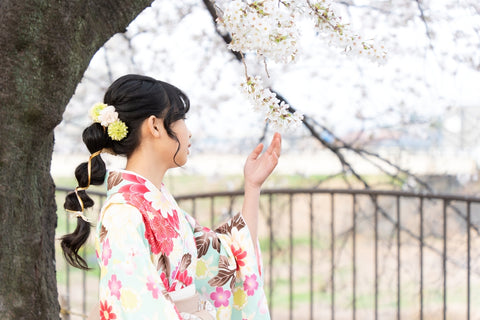
In Japan, the selection of graduation attire allows students the opportunity to express themselves while honoring the significance of the occasion. For the elementary school and junior high school graduations, students typically wear their school uniforms, whereas high school students often call for more formal attire. At universities, students can choose between traditional and modern attire for their graduation outfits. The decision-making process for selecting traditional versus modern dress is influenced by various factors, each with its own significance:
Traditional Attire: The traditional attire donned during graduation is called hakama, and features wide-legged trousers worn over a kimono. This practice harks back to the Meiji era, when Japanese students wore hakama as their school uniforms. Today, opting to have students wear traditional attire during a Japanese graduation ceremony serves as a tribute to cultural heritage and customs, symbolizing a deep respect for tradition.
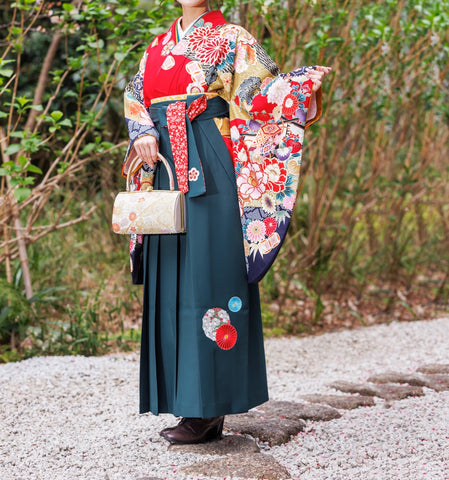
Modern Attire: Modern attire, such as Western-style suits and dresses, reflects contemporary fashion trends and global influences. Choosing to wear modern attire during a graduation ceremony in Japan can signify individuality, a break from tradition, and an embrace of modernity.

Cherry Blossoms and New Beginnings
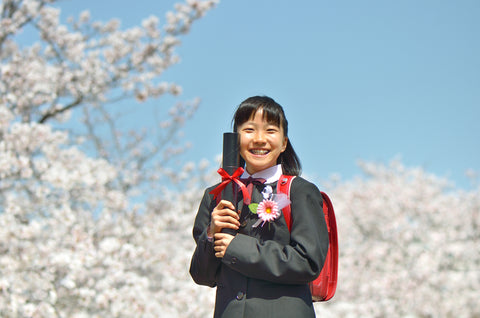
Indeed, the Japanese school year ends in March and begins in April, coinciding seamlessly with the cherry blossom season in the country. This alignment is not merely coincidental; it holds cultural and symbolic significance deeply ingrained in Japanese society.
Sakura, or cherry blossoms, symbolize renewal and rebirth, as they herald the arrival of spring and the start of a new cycle of life. This significance resonate deeply with graduates as they leave behind their academic endeavor and venture into the unknown terrain of adulthood.
And just as the delicate flowers fleetingly bloom and swiftly fall, so too is the transient nature of student life. This serves as a reminder for students to cherish each moment and live fully in the present.
The Heartfelt Melodies of Graduation
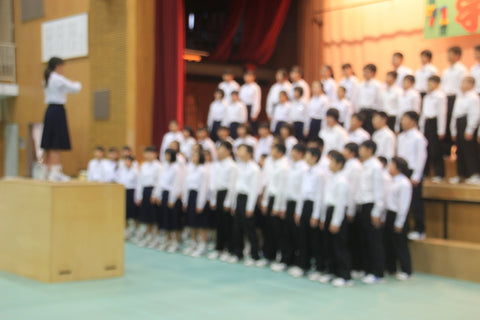
A graduation ceremony in Japan is deemed incomplete without the poignant moment of singing the school anthem one last time before students bid farewell and head off on their own journeys.
These anthems hold immense significance as they serve as powerful symbols of unity, pride, and tradition within educational institutions. The singing of the school song during graduation holds great emotional weight for students, as it represents the culmination of their academic journey and the shared experience they have had throughout their time at the school. It evokes a nostalgic reminder of the bonds formed with classmates and teachers, as well as the values and traditions upheld by the school community.
Presenting the Diploma: A Symbol of Achievement

For graduates, receiving their diplomas is the ultimate validation of their efforts and academic prowess. It represents the culmination of years of late nights of diligent studying and personal sacrifices made in pursuit of knowledge. And as students march across the stage to receive their graduation certificates, surrounded by their peers and teachers, they are filled with a sense of pride and accomplishment, fully aware that their unwavering perseverance has borne fruit.
With their diplomas in hand, graduates are formally equipped to embark on the next chapter of their lives with confidence and determination.
Voices of the Future: Graduation Speeches
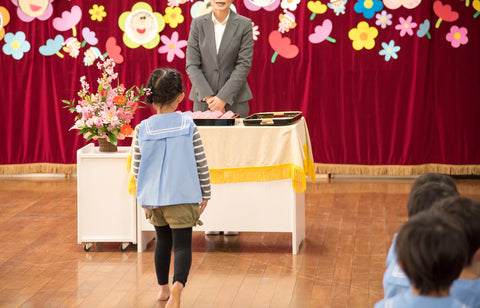
Central to a graduation ceremony is the tradition of graduation speeches, delivered by both students and teachers, offering heartfelt reflections on past experiences and hopes for the road ahead.
Student graduation speeches provide a platform for students to share their personal reflections and express gratitude to those who have supported them over the course of their academic journey. These speeches often touch upon the challenges and triumphs they have encountered, as well as the invaluable lessons learned both inside and outside the classroom. It is a chance for students to offer their heartfelt thanks to their parents and teachers who have played a pivotal role in shaping their academic and personal growth. Faculty members, including the school principal, also play a significant role in these ceremonies by delivering speeches to graduating students. It provides teachers with a platform not only to express pride in the students' achievements, but also to motivate and inspire them as they embark on new endeavors beyond their school years.
A Tradition of Gratitude: The Exchange of Letters

In Japan, the tradition of exchanging letters between students and teachers during graduation ceremonies adds a unique and deeply personal touch to the graduation experience. This interesting custom highlights the importance of meaningful connections and offers a heartfelt opportunity for reflection, gratitude, and closure.
For students, writing a letter to their homeroom teachers is a chance to express their gratitude for the guidance, encouragement, and support received over the course of their educational journey. Similarly, for teachers, receiving letters from their students is a touching and humbling experience. It serves as a testament to the profound impact that they have had on the lives of their students and reaffirms the importance of their role in shaping the future generation. These letters are often exchanged during the graduation ceremony, where both students and their homeroom teachers take turns reading out their messages, often marked by tears of gratitude and nostalgia.
Memories to Hold: Graduation Day Souvenirs

Graduation day souvenirs serve as tangible reminders of the bonds formed in class and the cherished memories shared during students' time in school. Here are some of the mementos students receive to commemorate this special day:
-
Class Photos: Class pictures are a timeless tradition in Japanese graduation ceremonies, capturing the camaraderie and bond shared during the students' academic journey.
-
Yearbooks: Yearbooks capture the highlights of the academic year, including pictures of students, teachers, and memorable events. They serve as cherished keepsakes, allowing graduates to reminisce about their time at school and stay connected with classmates and teachers for years to come.
-
Second Button: On graduation day at junior high or high schools in Japan, it's a common tradition, often depicted in Japanese anime and manga, for junior high school boys to give the second button of their school uniform to girls as a heartfelt gesture of confessing their love towards them.
-
Personalized Graduation Gifts: Most schools offer personalized graduation gifts, such as commemorative plaques, engraved pens, or traditional Japanese fans, as tokens of appreciation for students' dedication and preservation. These gifts demonstrate the school's support for the students as they venture into a new chapter of their lives.
Celebrating Together: Post-Ceremony Festivities

The social aspect of Japanese graduation is characterized by a sense of community, camaraderie, and celebration. After the formalities of the school graduation ceremony, students celebrate this important milestone with their families and peers, as they mark the end of one chapter and the beginning of another.
Family gatherings are a cornerstone of Japanese graduation celebrations, as they provide an opportunity for parents to congratulate their graduates and offer words of encouragement to them as they embark on their next journey. In addition to these gatherings, student parties are a common feature of Japanese graduation celebrations. Often organized by the graduating class, these joyful parties offer a chance for students to reminisce about their school memories and come together one last time before going their separate ways.
Bridging the Past and Future: Alumni Engagement

Alumni play a multifaceted role in a Japanese graduation ceremony, serving as ambassadors of the school's heritage, mentors to graduating students, and inspirations for future generations.
Alumni often participate in graduation ceremonies as guests or speakers, imparting their insights and experiences to current students. Additionally, they play a significant role to the ceremony by presenting awards or scholarship, showcasing their unwavering support for the school and its students. Their sustained commitment and advocacy for the school's principles in their professional fields and communities also create a lasting legacy for future generations.
Innovations in Ceremony: Modern Adaptations

Most schools are increasingly fusing modern elements into traditional ceremonies to keep them relevant with today's youth. From technological integrations to interactive components, these innovations aim to enhance the ceremony's relevance and engagement.
Integrating multimedia elements into performances, providing students with chances to personalize their graduation experience by composing their own graduation songs or designing digital yearbooks, selecting non-traditional venues for the ceremony, and leveraging social media platforms to share ceremony highlights represent some of the methods schools are modernizing these ceremonies.
Graduation's Role in Pop Culture and Media
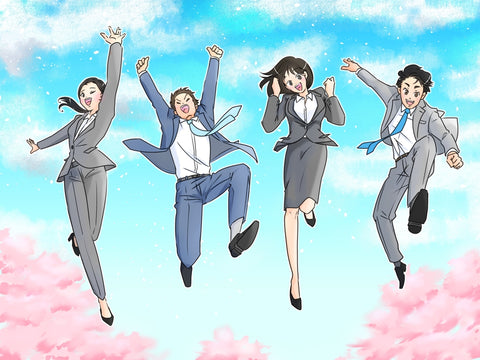
In Japan, the graduation ceremony stands as a poignant symbol of transition, growth, and new beginnings. Beyond its academic significant, this cultural milestone has found its way into various forms of pop culture and media, shaping narratives and evoking emotions across different platforms.
From anime and manga to Japanese dramas and films, popular media frequently explore the theme of graduation, depicting the emotional farewell between characters as they embark on a new journey. Whether it's a heartwarming coming-of-age story or a nostalgic reflection on the past, these ceremonies serve as compelling backdrops for storytelling and resonate deeply with audiences.
Reflecting on the Journey Through Education

In essence, the graduation ceremony in Japan stands as a pivotal moment of transition, marking the culmination of an educational journey while heralding the anticipation of future endeavors. As students begin to prepare for a new chapter in their lives, the ceremony serves as a poignant reminder of their achievements, the support of their families and teachers, and the boundless potential that awaits. Truly, the graduation ceremony in Japan is not merely an end, but a new beginning.
Celebrate your favorite graduate's achievement with a gift as unique and special as they are, making this graduation season truly unforgettable. At Bokksu Boutique, we're proud to offer a curated selection of premium Japanese snacks and gifts that make the perfect graduation present.
Author Bio























